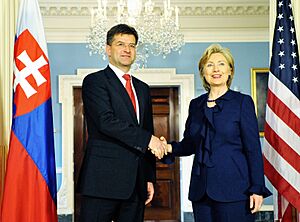Miroslav Lajčák facts for kids
Quick facts for kids
Miroslav Lajčák
|
|
|---|---|
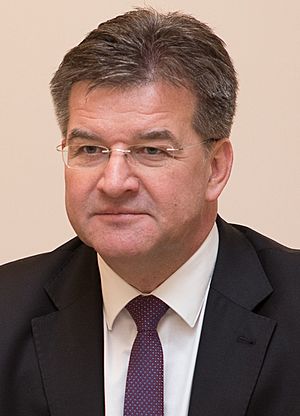
Lajčák in 2020
|
|
| EU Special Representative for the Belgrade-Pristina Dialogue and other Western Balkan regional issues | |
| In office 2 April 2020 – 31 January 2025 |
|
| Preceded by | Position established |
| Succeeded by | Peter Sørensen |
| President of the United Nations General Assembly | |
| In office 12 September 2017 – 19 September 2018 |
|
| Preceded by | Peter Thomson |
| Succeeded by | María Fernanda Espinosa |
| Minister of Foreign Affairs | |
| In office 4 April 2012 – 20 March 2020 |
|
| Prime Minister | Robert Fico Peter Pellegrini |
| Preceded by | Mikuláš Dzurinda |
| Succeeded by | Ivan Korčok |
| In office 26 January 2009 – 8 July 2010 |
|
| Prime Minister | Robert Fico |
| Preceded by | Ján Kubiš |
| Succeeded by | Mikuláš Dzurinda |
| Chairperson-in-Office of the Organization for Security and Co-operation in Europe | |
| In office 1 January 2019 – 1 January 2020 |
|
| Preceded by | Enzo Moavero Milanesi |
| Succeeded by | Edi Rama |
| High Representative for Bosnia and Herzegovina | |
| In office 1 July 2007 – 25 March 2009 |
|
| Preceded by | Christian Schwarz-Schilling |
| Succeeded by | Valentin Inzko |
| European Union Special Representative for Bosnia and Herzegovina | |
| In office 1 July 2007 – 28 February 2009 |
|
| Preceded by | Christian Schwarz-Schilling |
| Succeeded by | Valentin Inzko |
| Personal details | |
| Born | 20 March 1963 Poprad, Czechoslovakia (now Slovakia) |
| Political party | Communist Party (1983–1990) Direction - Social Democracy (associated non-member) |
| Spouse | Jarmila Lajčáková-Hargašová |
| Children | 3, including Vanesa |
| Alma mater | Comenius University in Bratislava, Faculty of Law Moscow State Institute of International Relations |
Miroslav Lajčák (born March 20, 1963) is a Slovak politician and diplomat. He served as the Minister of Foreign Affairs for Slovakia several times. He also held the important role of President of the United Nations General Assembly from 2017 to 2018.
Mr. Lajčák played a key role in helping solve problems in the Western Balkans after conflicts. He helped organize the 2006 Montenegrin independence referendum for the European Union. From 2007 to 2009, he was the High Representative for Bosnia and Herzegovina, working to bring peace and stability.
From 2020 to 2025, he was the European Union Special Representative for the Belgrade-Pristina Dialogue. This role focused on improving relations between Serbia and Kosovo. After this, he became a special advisor to the Slovak Prime Minister.
Contents
Miroslav Lajčák: A Diplomat's Journey
Early Life and Education
Miroslav Lajčák grew up in Slovakia. He attended primary school in Stará Ľubovňa. Later, his family moved to Bratislava, where he continued his schooling. He studied law at Comenius University in Bratislava. He also earned a master's degree in international relations from the Moscow State Institute of International Relations.
A Career in Diplomacy
Representing Slovakia Abroad
Mr. Lajčák began his diplomatic career in 1988. He worked for the Czechoslovak foreign ministry. From 1991 to 1993, he was posted at the Slovak embassy in Moscow. When Slovakia became an independent country, he helped create its new Foreign Service.
In 1994, he became the Slovak Ambassador to Japan. He was the youngest head of a diplomatic mission for Slovakia at just 31 years old. After his time in Japan, he returned to Slovakia's Foreign Ministry.
International Peace Efforts
In 1999, Mr. Lajčák started working internationally. He assisted the UN Secretary-General's Special Envoy for the Balkans. From 2001 to 2005, he was Slovakia's Ambassador to the Federal Republic of Yugoslavia (later Serbia and Montenegro).
In 2005, the EU asked him to oversee the 2006 Montenegrin independence referendum. This vote decided if Montenegro would become an independent country. The referendum was approved, and Montenegro became independent.
From 2007 to 2009, Mr. Lajčák served as the High Representative for Bosnia and Herzegovina. He also acted as the European Union Special Representative there. During his time, Bosnia and Herzegovina signed an important agreement with the EU. This agreement aimed to bring the country closer to the European Union.
Leading Slovakia's Foreign Affairs
Mr. Lajčák served as Minister of Foreign Affairs for Slovakia twice. His first term was from 2009 to 2010. His second term lasted from 2012 to 2020. He worked under Prime Ministers Robert Fico and Peter Pellegrini.
During his time as Foreign Minister, he focused on Slovakia's role in Europe. He also worked on relations with other countries. He encouraged dialogue and cooperation.
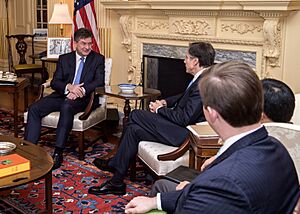
In 2016, Slovakia held the Presidency of the Council of the European Union. Mr. Lajčák played a key role in setting the priorities for this period. He emphasized Slovakia's commitment to Europe.
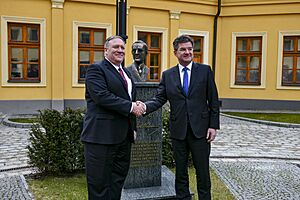
Guiding EU Diplomacy
From 2010 to 2012, Mr. Lajčák helped create the European External Action Service. This is the European Union's diplomatic service. He was the managing director for Europe and Central Asia. He also served as the EU's chief negotiator for agreements with Ukraine and Moldova.
Presiding Over the UN General Assembly
From 2017 to 2018, Mr. Lajčák was the President of the United Nations General Assembly. This is a very important global role. He worked to promote dialogue and cooperation among nations. He also encouraged strengthening international teamwork. He was the first president to share his financial information publicly.
Chairperson of the OSCE
In 2019, Mr. Lajčák served as the Chairperson-in-Office of the Organization for Security and Co-operation in Europe (OSCE). He focused on people, dialogue, and stability in Europe. He visited many OSCE offices to highlight their work. He also held talks with leaders across the region.
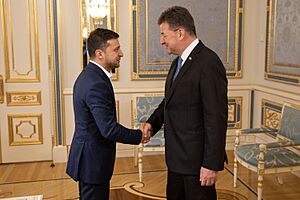
EU Special Representative for the Western Balkans
On April 2, 2020, Mr. Lajčák was appointed as the EU Special Representative for the Belgrade-Pristina Dialogue. This role focused on improving relations between Serbia and Kosovo. He also worked on other regional issues in the Western Balkans. His term was extended several times to ensure continuity in important talks.
His work in this role faced some criticism. In April 2024, a German Member of the European Parliament described his performance as a "disaster." Mr. Lajčák was considered for a new role as EU Ambassador to Switzerland. However, this appointment was cancelled to maintain stability in the Dialogue. His mandate as EU Special Representative ended on January 31, 2025. Peter Sørensen succeeded him.
Special Advisor to the Prime Minister
After his work as EU Special Representative, Mr. Lajčák returned to Slovak diplomacy. He became a Special Advisor to Slovak Prime Minister Robert Fico. His focus was on security issues and the Western Balkans.
Resignation
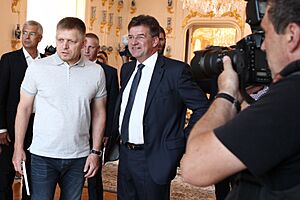
On January 31, 2026, Mr. Lajčák resigned from his role as Special Advisor. Prime Minister Robert Fico accepted his resignation.
Other Activities and Interests
Miroslav Lajčák is involved in several international organizations. He also participates in academic institutions.
- European Council on Foreign Relations (ECFR), Member
- Friends of Europe, Member of the Board of Trustees
- The Geneva Centre for Human Rights Advancement and Global Dialogue, Member of the Advisory Board
- GLOBSEC, Member of the International Advisory Council
- European Alpbach Forum (EFA), Member of the International Advisory Board
- Matej Bel University, member of the Scientific Council
- Slovnaft, Supervisory Board Member
Personal Life
Miroslav Lajčák is married to Jarmila Lajčáková-Hargašová, a Slovak television presenter. They have a daughter named Lara. Mr. Lajčák also has another daughter, Nikola, from a previous marriage. His wife, Jarmila, has a daughter named Vanesa from a previous relationship.
Besides his native Slovak, Mr. Lajčák speaks several other languages. These include English, German, Russian, French, and South Slavic languages.
Awards and Recognition
State Honors
 Serbia and Montenegro:
Serbia and Montenegro:
 Moldova:
Moldova:
 Montenegro:
Montenegro:
 Sweden:
Sweden:
 Romania:
Romania:
 Japan:
Japan:
 Order of the Rising Sun, 1st Class, Grand Cordon (2022)
Order of the Rising Sun, 1st Class, Grand Cordon (2022)
Honorary Degrees
 Bulgaria:
Bulgaria:
- University of National and World Economy
 Bosnia and Herzegovina:
Bosnia and Herzegovina:
- University of Mostar
 Russia:
Russia:
- Moscow State Institute of International Relations
 Romania:
Romania:
- National University of Political Studies and Public Administration
 Montenegro:
Montenegro:
- University of Montenegro
See also
 In Spanish: Miroslav Lajčák para niños
In Spanish: Miroslav Lajčák para niños
- List of foreign ministers in 2017
 | Georgia Louise Harris Brown |
 | Julian Abele |
 | Norma Merrick Sklarek |
 | William Sidney Pittman |


